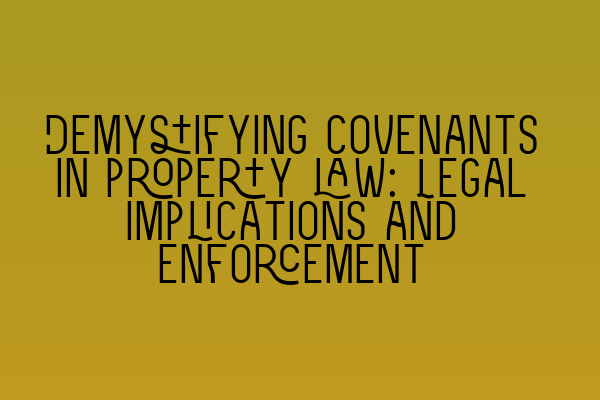Demystifying Covenants in Property Law: Legal Implications and Enforcement
When it comes to property law, one aspect that often confuses individuals is the concept of covenants. Covenants are legal obligations or promises that are attached to a property and bind the current and future owners of that property. These obligations can have significant legal implications and must be adhered to in order to avoid potential disputes and legal actions.
In this blog post, we will demystify covenants in property law, exploring their different types, legal implications, and methods of enforcement. Whether you are a property owner, buyer, or simply interested in understanding property law, this post will provide you with valuable insights to navigate the complex world of covenants.
Types of Covenants
Covenants come in various forms, but the most common types are positive and restrictive covenants. Positive covenants require the property owner to actively do something, such as maintaining a fence or contributing to the maintenance of shared amenities. Restrictive covenants, on the other hand, restrict the owner from engaging in certain activities or behaviors, such as running a business from the property or making alterations without approval.
Understanding the Legal Implications
Covenants have legal implications that affect both the current and future owners of a property. When a property is sold, covenants are typically binding on the new owner, meaning they must continue to honor the obligations set forth in the covenant. Failure to do so can result in legal repercussions, such as injunctions, financial penalties, or even a forced sale of the property.
Enforcement of Covenants
To enforce covenants, a party may need to take legal action. This could involve initiating court proceedings, seeking an injunction, or pursuing other legal remedies. Depending on the nature of the covenant and the circumstances, enforcement can be a complex and time-consuming process. However, it is crucial to uphold the integrity and value of the property by ensuring that covenants are respected.
It’s important to consult with a qualified property law solicitor when dealing with covenants to ensure that you understand your rights and obligations. An experienced solicitor can provide guidance, negotiate on your behalf, and represent you in legal proceedings, if necessary.
Demystifying Covenants in Property Law: Legal Implications and Enforcement
In conclusion, covenants play a vital role in property law, serving to protect the interests of property owners and maintain the value of properties within a community. By understanding the different types of covenants, their legal implications, and methods of enforcement, property owners and buyers can navigate the intricacies of property law more effectively.
If you are preparing for a career in property law or seeking professional assistance, SQE Property Law & Land Law at SQE Property Law & Land Law can provide comprehensive guidance and support. They offer SQE preparation courses and SQE 1 practice exams to help you excel in your legal career. Additionally, their SQE 2 preparation courses will equip you with the necessary knowledge and skills to succeed in the legal field.
Stay up to date with the latest SRA SQE exam dates to ensure you are well-prepared for upcoming exams. Continuing professional development is essential for legal professionals, and the team at SQE Property Law & Land Law can help you stay ahead of the curve.
Demystify covenants in property law and ensure compliance to protect your property and legal interests. Contact SQE Property Law & Land Law today to learn more about their services and how they can assist with your property law needs.
Related Articles:
– SQE 1 Practice Exam Questions
– SQE 1 Practice Mocks FLK1 FLK2
– SQE 2 Preparation Courses
– SQE 1 Preparation Courses
– SRA SQE Exam Dates
